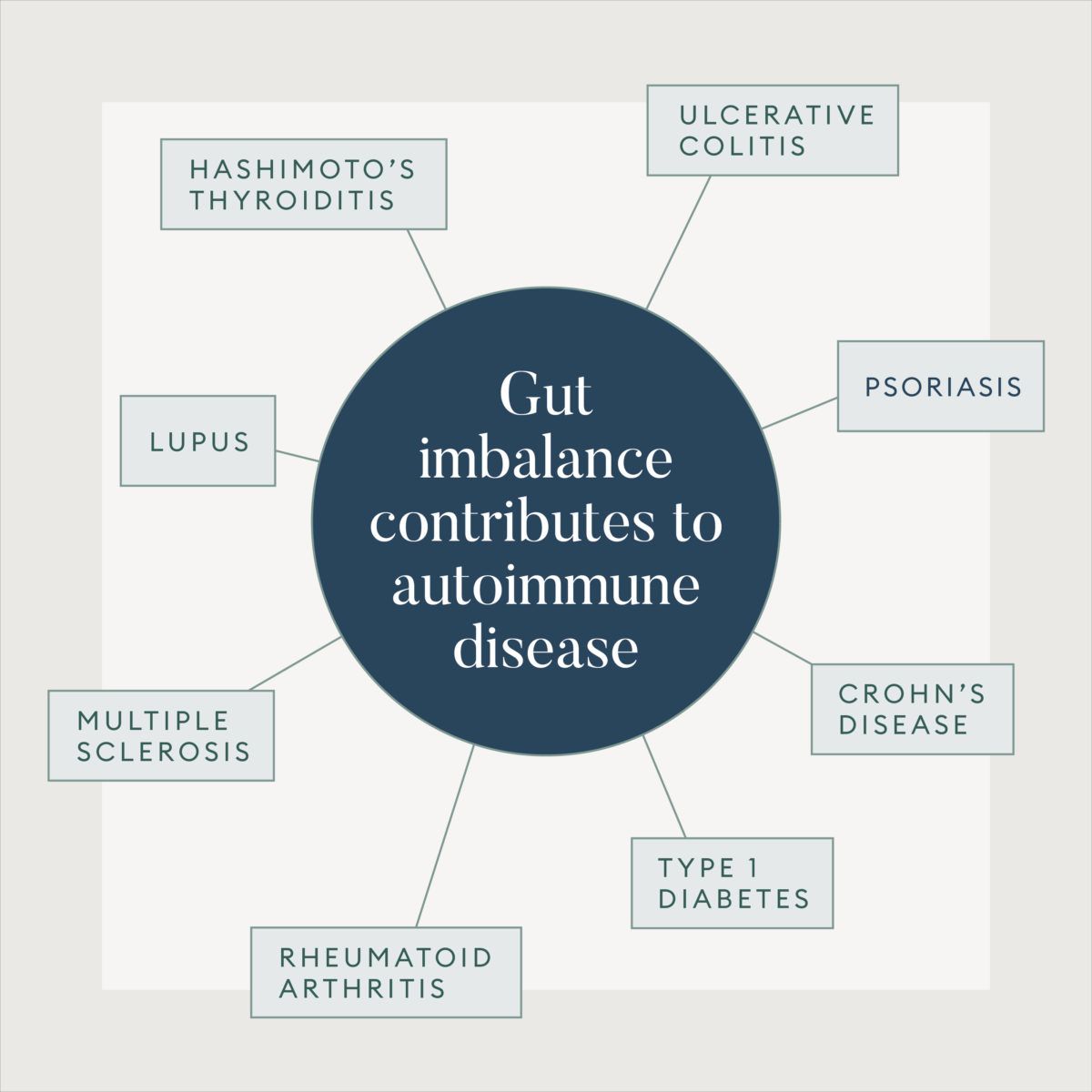Autoimmune diseases happen when the immune system mistakenly attacks normal, healthy cells in the body, but you can help bring your body back to balance by overhauling your lifestyle, and in particular, honing in on a personalized autoimmune disease diet.
Sound too good to be true? It all comes down to the power that nutrition and lifestyle changes have on improving your gut health and reducing inflammation, a commonality amongst all autoimmune diseases. Inflammation is part of the immune system’s response to a foreign invader. It’s helpful when acute, like if you have a cold or get a cut, but with autoimmunity, your body is chronically inflamed because it’s trying to fight off your own healthy cells. That can lead to symptom flare-ups and increase your risk for things like heart disease, cancer, and more. Reducing inflammation and healing the gut is imperative for treating autoimmune disorders.

It starts in your gut
About 70 percent of your immune system is located in the lining of your gut so when you’re dealing with heightened inflammation and immune system dysfunction, supporting your intestinal health is essential. When your gut microbiome is imbalanced, it can influence autoimmunity, research shows. Things like mental health, diet, and sleep deprivation can alter the balance of good and bad bacteria in your gut and promote inflammation. For example, a high-fiber diet increases good gut bugs like bifidobacteria and lactic acid bacteria, while diets low in prebiotics reduce total bacterial abundance, shows research in the Journal of Translational Medicine. And a 2019 review in the Journal of Neuroscience Research found that patients with major depressive disorder have a different microbiome composition than those without depression.
By supporting a healthy microbiome, you can prevent and manage flare-ups when they occur.
“To bring back balance, we first start with some lifestyle non-negotiables, including stress management and making sure they’re getting excellent sleep,” says Erica Favela, a health coach at Parsley Health. “These two lifestyle factors are absolutely critical in giving the body an opportunity to heal and restore, and I actually prioritize these factors before bringing food into the conversation.”
Then, food comes in to help restore gut health. For instance, if a member comes in with Hashimoto’s disease, an autoimmune disorder that can cause an underactive thyroid (hypothyroidism), and they’re still eating gluten and dairy, Favela will help them replace those two food groups first. “These are some of the top pro-inflammatory foods and especially problematic for thyroid tissue due to molecular mimicry,” she explains. (AKA when a foreign substance has structural similarities to your own healthy cells.)
A 2014 study in Autoimmune Diseases even found that certain amino acids that make up the proteins in milk can mimic collagen and induce rheumatoid arthritis (RA), an autoimmune disease that attacks the joints.
And if you have a leaky gut (a weakening of your gut barrier that allows molecules to move across your intestinal lining) as a result of an autoimmune disease, your immune system might respond to the allergenic compounds in gluten and dairy and cause digestive symptoms like gas and bloating.
While more research is still needed to understand the role food plays in autoimmunity, there is promise that removing some of these inflammatory foods can help with the management of autoimmune disease.
How nutrition can help heal autoimmune disease
What your nutrition goals should look like and what approach you should take to healing your gut will depend on what’s going on in the gut, Favela says. Parsley Health’s doctors can help you identify what’s going on in your gut by conducting a gut microbiome test. “Is there overgrowth in the small intestine? A parasitic infection? Microbial dysbiosis? By having that sort of clarity, we are able to be more targeted with healing,” Favela says.
That said, these helpful nutrition tips from Favela can help you incorporate an autoimmune disease diet that reduces inflammation and helps manage symptoms.
1. Figure out your trigger foods.
While everyone’s trigger foods will be different depending on their autoimmune disorders, Favela says there are certain foods to avoid with autoimmune disease, such as grains, gluten, dairy, refined and added sugars, alcohol, coffee, and nightshades for a period of time and then reintroducing them slowly when symptoms are reduced. A health coach can help you do this in a systematic way to best understand your triggers.
“The main thing to understand is that for many people, these foods may be triggering due to a hyperpermeable intestinal lining. For some, restoring the intestinal lining may allow them to be tolerant of these foods again,” she says.
Because people with autoimmune disorders tend to have a leaky gut, which weakens the lining of the intestines, certain molecules that aren’t supposed to enter the gut, creating inflammation and changing the bacterial composition of the microbiome. This can confuse the immune system to target foods you had no problem digesting before, leading to unpleasant symptoms.
“This is where it becomes really helpful to do a structured reintroduction process. The reintroduction process takes place when symptoms have greatly reduced, or in some cases, are resolved. Once someone gets to this new baseline, it’s like having a clean slate to bring in foods and see if their symptoms are triggered,” Favela says. If you reintroduce a food and it causes a reaction, then you should avoid that food so that your gut can continue to heal.
2. Try an autoimmune Paleo diet (AIP)
“If someone is already avoiding top pro-inflammatory foods, then we take the next step from there, perhaps it’s moving to a more Paleo diet approach and then into the Autoimmune Paleo Diet (AIP), but it all depends on the individual and what they can realistically commit to,” Favela says.
If your symptoms improve after a more basic elimination diet and removal of trigger foods, you may not need to try the AIP diet, a targeted autoimmune disease diet.
The AIP diet is an elimination diet that promotes restoring good gut health and healing the immune system. The issue is the AIP diet can be very restrictive. The elimination phase of the diet lasts 30 days and involves removing grains, dairy, gluten, legumes, nuts, seeds, nightshade produce, processed foods, and vegetable oils, as well as sugar and sweeteners from your diet to identify foods that may trigger a flare-up.
3. Focus on eating a variety of healthy foods
A common mistake people make when trying to follow an anti-inflammatory diet for autoimmune diseases is restricting the list of foods they can eat, and eating those same foods over and over again, Favela says.
“It can be helpful to focus on what foods to eat as opposed to what foods to avoid. The AIP diet emphasizes plenty of plant foods, and there are literally hundreds of fruits and vegetables to choose from. The diet also emphasizes incorporating foods rich in omega-3s for their anti-inflammatory effects, including grass-fed meats, like bison, or seafood, like sardines and salmon,” she explains.
While it might be convenient and easy to choose the same veggies and proteins to make your salad, Favela says it can actually be harmful. “This is not great for the body, as it can lead to loss of tolerance simply due to overexposure to the same foods, especially if implemented over the long term,” she says.
Adding a variety of fruits and vegetables into your diet can help prevent intolerances and ensure you’re getting a spectrum of vitamins and minerals. Favela suggests changing up the produce you eat according to season. “Shopping at the farmer’s markets or subscribing to a local CSA box helps people change things up. The AIP diet is also an opportunity to explore less popular and more traditional foods, like offal (organic meats such as liver) and sea vegetables, including arame, nori, and dulse,” she says.
4. Address nutrient deficiencies
Favela says some common nutrient deficiencies in people with autoimmune disorders are in fat-soluble vitamins, such as vitamins A and D, as well as omega-3 fatty acids and minerals, zinc and magnesium.
According to a 2018 review in Nutrients, a vitamin D deficiency in chronic conditions, like type 1 diabetes and rheumatoid arthritis, has been associated with increased inflammation and deregulation of the immune system. Patients with rheumatoid arthritis also had lower vitamin D levels than healthy patients, found a review in PLOS One. Vitamin D is important for immune function and reducing inflammation, according to the National Institutes of Health.
Moreover, a 2016 study in the Journal of Molecular Neuroscienceshows that patients with multiple sclerosis (MS), an autoimmune disorder that affects the nervous system, tend to have lower plasma levels of vitamin A. Vitamin A deficiency can cause pathogenic cell production in people with MS.
To help treat these nutrient deficiencies, Favela recommends filling up on vitamin A-rich foods, like beef liver and wild Alaskan fermented cod liver oil, and vitamin D-rich foods, such as sardines and salmon. For foods that are excellent sources of zinc, go for oysters, beef, crab, turkey, and chicken. And those that are high in magnesium, check out mackerel, spinach, Swiss chard, and avocado.
If you have an autoimmune disease, your doctor should be regularly checking your levels of these key nutrients. Parsley Health’s doctors monitor nutrient levels in all members and help to optimize them through supplementation and by adjusting your diet with your health coach.




